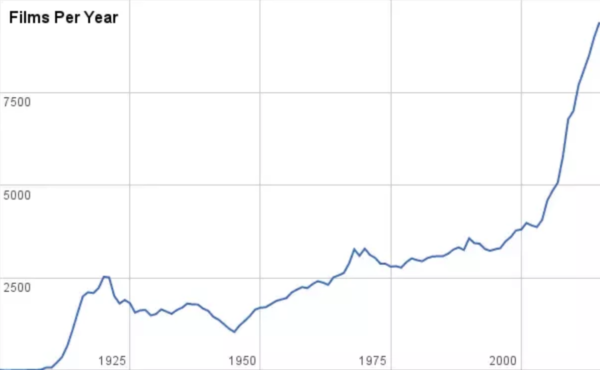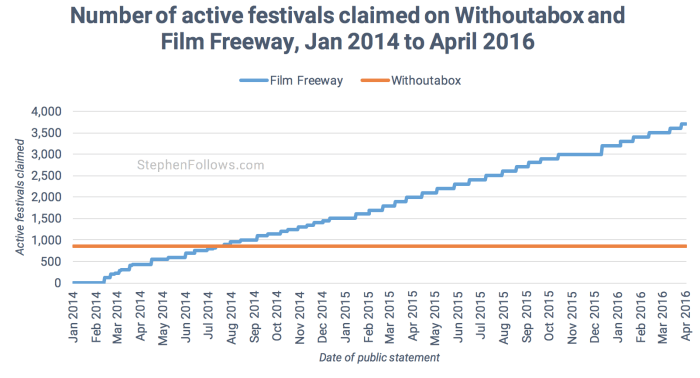Film Festivals – Why They’re More Important To Your Film Career Than Ever
One of the great myths of of the film business (and the entertainment business) is that talent and hard work will be discovered, you just have to keep trying. Someone even claimed that if you made a great movie and left it on a VHS in the street, it would be discovered.
Although I would love to believe it were true, I have to disagree with that claim. I mean, if it really was true, why do studios spend billions of dollars promoting their films?
I’ll give you one reason – there’s a huge amount of stuff out there competing for our attention. We have high definitions movies, TV shows, video games, blogs, vlogs, snapchat, Instagram, twitter, Facebook, news shows, news apps… and that’s just the stuff we get via our smartphones in our pockets.
If you left your movie on a VHS on the street, people would just walk past it, glued to their iPhone screen.
As Yuval Noah Harari says, we have moved from the age where “information is power” to the age of “filtering out the less important information is power”. We are living in an age where many of us are subjected to an unrelenting flow of content.
This makes it harder and harder for filmmakers to get noticed.
How has this changed the film industry?
Independent filmmaker Richard Linklater was one director who got his break into the industry by funding and shooting his first feature. But now, he says, making your own feature film is “no longer a story.”
“When Slacker opened on July 4th, 1991, the only other film that opened that day was the next Terminator – Terminator 2 – the first film that cost over $100m. So it was like ‘here we have one that cost 23 (thousand dollars) and here we have one that cost 100 million’… so I caught the end of the budget being a marketable… nobody cares how cheaply you shot your movie. It’s not sexy any more.” Richard Linklater, talking about his debut feature Slacker.
It’s not news anymore because it’s become much easier to achieve. And there’s now a huge explosion in the number of feature films being made each year.

Are you or your script/film marketable?
If you are looking at the film industry as a career path, you will most likely encounter this uncomfortable truth at some point. Projects generally receive private funding (state funding is different) if they are deemed to be a decent bet when it comes to investing large sums of money.
I’ve written about this previously – the value of a creative work is entirely subjective. To persuade investors, it helps greatly to have some perceived marketable value. This might be a well written genre script (because there are historical references to how certain genres perform in the marketplace). Or you might have a well known actor attached. The script might be an adaptation of a best selling novel (but only if own the rights to make a film from it).
What other ways are there to increase you or your project’s market value? Winning an award or three might help.
Stand out from the rest
The more successful a filmmaker is, the less inclined they will be to have a look at your project. That’s because they’re busy trying to stay afloat in a tough, fickle industry. So the more you have that shows you are serious, dedicated, professional and have a talent (which has been recognised by people other than your friends and family), the better.
Well, it’s no secret that having your film selected for Sundance, Berlin or Cannes will give you a big career boost. But even a selection or award from the smaller festivals will help, too.
Interestingly, the number of films being made is matched by the increase in festivals being formed.

Even with a smartphone film festival like MoMo, there are far more submissions than selections. Therefore, a selection or an award adds value to your film and you as a filmmaker. An endorsement from a well regarded festival will always add something to your profile.
Of course, a festival’s opinion is also totally subjective. However – at least with our festival – not only do we have 2 pre-selectors, we also have a jury of final selectors. So that’s 5 or 6 people watching films and deciding which ones stand out.
What I am saying is, in an increasingly overcrowded area, one way to elevate yourself above the competition is to have a festival promote your work. If you are looking to fund your feature, producers will be more inclined to take a meeting or read your pitch if your film is an official selection for the Mobile Motion Film Festival.
And that’s why, when there’s more and more content being made, a film festival’s function as a filter for narrowing the field is more important than ever.
Thing is, we want to give you the best chance possible of making it through and realising your ambitions as a filmmaker, vlogger or mobile journalist. That’s why we do our best to help you to make your best films with the best equipment around, with tips from experienced micro-budget filmmakers.
The film industry can sometimes be a bit of a nightmare, but we at MoMo Film Fest can help you turn it into a dream.
Eager to learn more?
Join our weekly newsletter featuring inspiring stories, no-budget filmmaking tips and comprehensive equipment reviews to help you turn your film projects into reality!
Simon Horrocks
Simon Horrocks is a screenwriter & filmmaker. His debut feature THIRD CONTACT was shot on a consumer camcorder and premiered at the BFI IMAX in 2013. His shot-on-smartphones sci-fi series SILENT EYE featured on Amazon Prime. He now runs a popular Patreon page which offers online courses for beginners, customised tips and more: www.patreon.com/SilentEye


